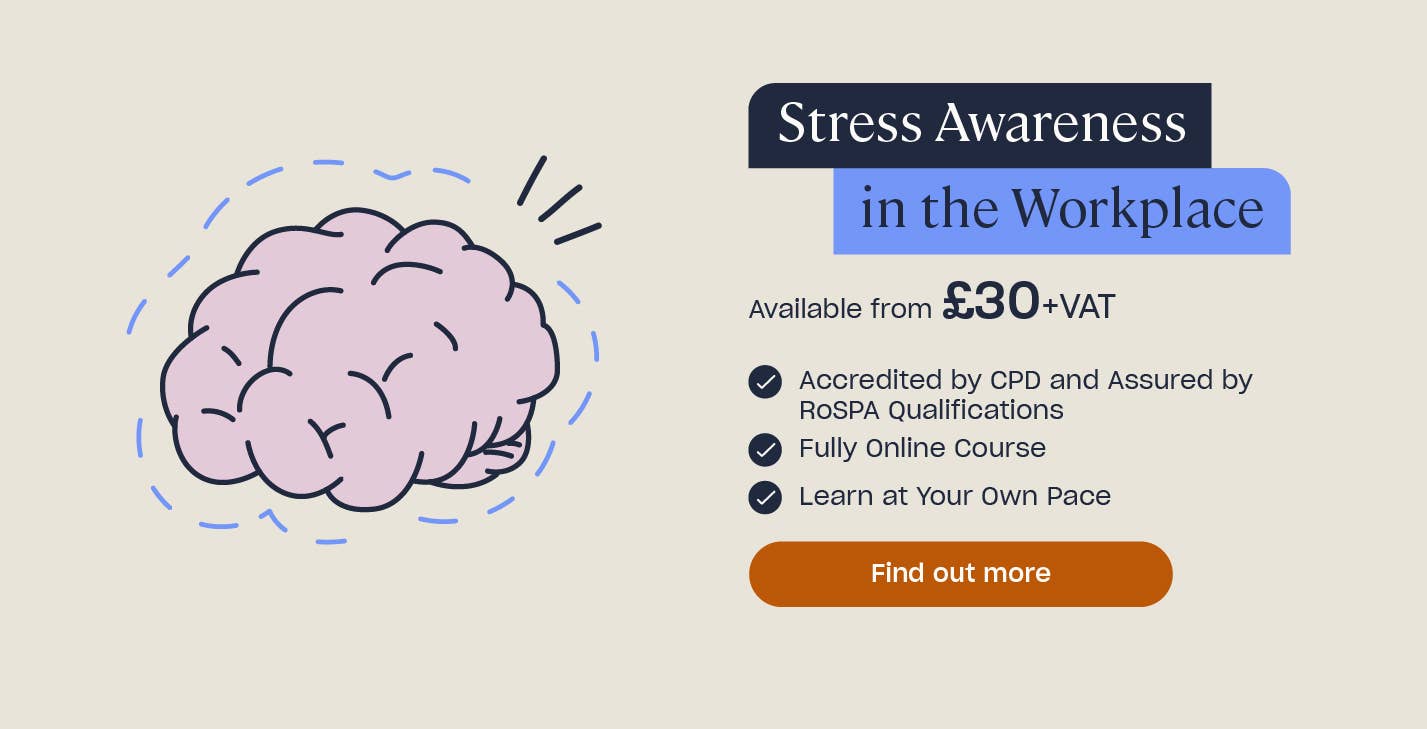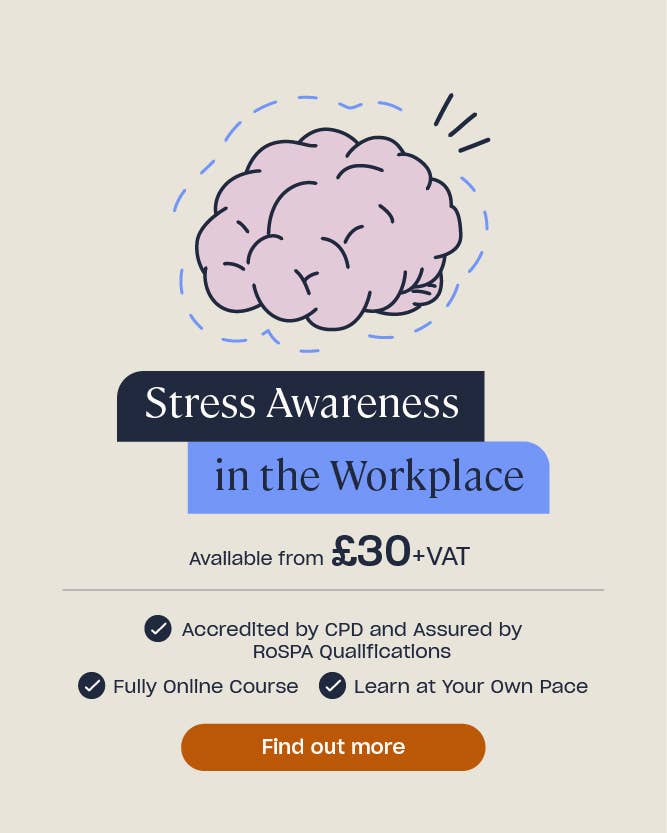How to Manage Stress at Work
Experiencing levels of stress in the workplace is common. It can be a positive thing by helping people to increase their productivity and strive to achieve their goals. However, stress is also a significant cause of illness and, along with anxiety and depression, is the largest cause of sickness absence and high staff turnover in the UK. This can affect a business’ productivity along with the mental wellbeing of its staff. Therefore, it’s crucial that we all understand how to manage stress at work.
In this article, we will outline what workplace stress is and examine some of the common causes of it. We will also look at the signs that indicate someone is struggling with stress and provide some tips and advice for managing stress at work.
What is Workplace Stress?
Work-related stress develops when a person struggles to cope with the demands placed on them, and stress is the body’s reaction to pressure or feeling threatened. Stress is a normal and natural part of life; however, everyone experiences it differently. For example, people can cope with different amounts of stress, and it can be caused by one particular issue, or a number of small problems that build up.
Stress is especially common in workplaces where the environment is fast-paced, of a high intensity or pressurised. However, stress can affect anyone in any job role or at any level of a business, so it is important that all employers have a strategy in place to deal with, and prevent, work related stress.

There are many reasons why people may feel stressed, just as there are many different types of mental health. We will look into these causes in more detail further in the article, however, the main sources of stress are:
- Tasks – the work is beyond the individual’s capability or capacity, they have too little work, they are overloaded with information or the work is very monotonous.
- Relationships – including interactions with other people, harassment and bullying.
- Unclear job role – there are opposing demands made by different people, or there is no clear idea of what is expected. There is little or no recognition for work done, a threat to personal safety or fear of redundancy or dismissal.
- Environmental factors – including noise, heat, lighting and cleanliness.
Under the Health and Safety at Work Act 1974 and Management of Health and Safety at Work (MHSW) Regulations 1999, employers must ensure the health, safety, and welfare of their employees at work, and this includes preventing work-related stress. The MHSW Regulations require employers to carry out risk assessments of their workplace to identify if existing control measures need updating and if they need to implement any new ones. This includes considering where work-related stress may occur. You can find a free workplace stress risk assessment in our article, here.
For more information on employers’ legal responsibilities, check out our article: Work Related Stress: Your Responsibilities as an Employer.
Need a Course?
Our Stress Awareness in the Workplace training course is designed to help both employees and managers identify stress and introduces a range of practical techniques that individuals can use to manage stressful situations.
Causes of Stress in the Workplace
As we’ve established, there are countless things that can cause people stress, and to varying degrees. However, in the workplace, there are some common causes that we’ll look at in detail below.
Demands of the job
Every job is demanding in its own way, and, in many instances, this is the main cause of stress in the workplace. For example:
- High work loads – If your role has tight deadlines, or the volume of work you’re expected to produce within a certain time-frame is high, it can be stressful trying to keep on top of it all and meet the expectations placed on you.
- Pressurised environments – If your role is in a high-paced or pressurised environment, you may feel stressed trying to keep yourself alert and on the ball. It may also involve multitasking, which can be demanding in itself – especially if required for long periods of time.
- Long hours – If you work long hours, it can be physically tiring and also mentally draining. It can also affect your work/life balance. Feeling as though you ‘live at work’ and are rarely at home can be a great source of stress.
Colleague relationships
Many people are required to work alongside or nearby others in their job role. You may work directly as part of a team or simply have to liaise with colleagues throughout your day. Naturally, this can be either a rewarding or stressful experience. If the latter occurs, it can lead to a negative work environment and a prominent cause of stress in the workplace.

There are many different reasons that conflict between colleagues occurs. Some of the most common include:
- Individual differences or clashing personalities.
- An employee being unsuitable or incompatible with their role.
- Changes within an organisation, including promotion or structural change.
- A workplace culture that promotes gossiping and rumours, leading to people feeling excluded or harassed.
- Perceived favouritism.
- Poor communication or miscommunication.
Need a Course?
Our Conflict Resolution Training course provides advice and strategies for employees to bring constructive outcomes from difficult situations. We also offer a range of short courses if you work in the hospitality or retail industry: Managing Customer Conflict in Hospitality, Managing Conflict in Retail and Interpersonal Conflict Training.
Problems with management
Conflict between an employee and a manager can also be a cause of stress. Most people are required in their role to answer to a line manager, and if that relationship isn’t healthy, it can have a detrimental effect on an employee’s mental wellbeing and job satisfaction.
A conflict between an employee and manager can develop due to any of the causes already discussed. However, it can also be due to:
- Time off or holiday requests being rejected.
- Being asked to perform a task without sufficient training.
- A lack of recognition or feeling undervalued.
- Employees not understanding the reasons behind them being asked to do something.
- Employees perceiving themselves to be working harder than their manager.
Customer or client expectations
Dealing with customers or clients most commonly occurs in customer-facing roles, such as within hospitality or retail environments. However, they can occur in any industry that deals with external parties, including suppliers, customers or clients. Trying – and potentially failing – to meet a customer or client’s expectations can be a great source of stress.
No matter the industry you work in, chances are you’re going to encounter a complaint of some kind – either directly or indirectly.
For example, some of the most common complaints include:
- The attitude of employees they encounter.
- Being made to wait longer than they expected.
- Mistakes from employees.
- The quality of the product or service they have paid for.
Check out our article for more information: How to Handle Customer Complaints.

Lack of proper resources or training
Training is vital for employees and for a business’ success. Feeling as though you haven’t been adequately trained for your job (or there aren’t sufficient resources in order for you to fulfil your duties properly) is a common reason for workplace stress.
Inadequately trained employees are likely to experience poor job performance and increased levels of work-related stress. Poorly trained employees are also likely to feel undervalued, which will reduce workplace productivity, loyalty and engagement.
To find out more, check out our article: The Consequences of a Lack of Training in the Workplace.
Working from home
In recent years, many organisations have chosen to implement hybrid working, meaning there is a large proportion of the workforce that operate from home.
For some people, being in their own home and space is a great comfort. However, it can also be a cause of stress in the workplace. For example:
- Working from home removes the separation of ‘work’ and ‘home’, and having the two blended together can feel as though you never leave work.
- There are more distractions at home, which can lead to people missing deadlines or letting their workload get on top of them.
- The working hours, if flexible, can blend into out-of-work hours, where it is easy to work longer hours than you would if you were working from an office, for example. The temptation to reply to an email or two can result in you never really switching off from being at work.
- While some enjoy the space, others can find working from home isolating, where they miss the in-person company of colleagues.

If you’d like to read more about working from home, check out our articles: Working from Home: Looking after your Mental Health and Weekly Working from Home Structure: Free Schedule Template.
Signs and Symptoms of Work Related Stress
If you, or someone you know, is experiencing stress then you (or they) are likely to be suffering as a result. At first, you may not realise that the symptoms are actually symptoms of the stress itself, but once you’ve identified the symptoms, it’ll be easier for you to deal with them. You can then look at managing the causes of your stress at work.
We have broken the signs and symptoms of work-related stress into four categories: physical, emotional, cognitive and behavioural/psychological, and they are explored in more detail below.
Physical symptoms
Stress can manifest in physical symptoms. These are the body’s reaction to a perceived or potential threat.
Some of the physical symptoms caused by stress include, but are not limited to:
- Tiredness and fatigue.
- A racing pulse and rapid breathing.
- Joint and muscle tension and aches.
- Shakiness, tremors and twitches.
- Heartburn, indigestion, diarrhoea and constipation.
- Nervousness, sweating and clammy hands.
- Dry mouth and throat.
- Rashes and eczema.
- Loss of appetite.
- Sleeping difficulties.
- Fidgeting, grinding teeth and clenched fists.
Physical symptoms of stress may require further medical advice in case there are other underlying reasons for them, and if physical symptoms persist then you should visit your doctor. If you experience frequent or high levels of stress, these physical symptoms may worsen or develop into long-term health conditions.

Emotional symptoms
Stress can also present itself in a number of emotional symptoms, as it can often affect our mood and overall emotional wellbeing.
Some of the emotional symptoms caused by stress include, but are not limited to:
- Feeling tense, angry or impatient.
- Feeling emotionally on-edge.
- Panic attacks.
- Fear or guilt for no reason.
- Feeling powerless or overwhelmed.
- Obsessions.
- Feeling as if everyone is out to get you.
- Depression.
Cognitive symptoms
Cognitive symptoms are associated with the way our mind experiences stress. These, therefore, affect the way we cope and manage situations while under stress.
Some of the cognitive symptoms caused by stress include, but are not limited to:
- Constant worrying.
- Racing thoughts.
- Forgetfulness and disorganisation.
- Inability to focus.
- Poor judgement.
- Only seeing the negatives.
- Difficulty making decisions.
Behavioural/psychological symptoms
Behavioural symptoms of stress, also known as psychological symptoms, are changes in your attitudes and behaviour due to stress.
Some of the behavioural/psychological symptoms caused by stress include, but are not limited to:
- Irritability, impatience and anger.
- Worry, anxiety and panic.
- Moodiness.
- Memory lapses and lack of concentration.
- Absences from work, low morale and low productivity.
- Loss of sense of humour.
- Social withdrawal.
- Depression and being easily reduced to tears.
- Insomnia.
- Boredom.
- Increased alcohol consumption.

How to Cope with Stress at Work
Understanding how to cope with stress when you experience it is just as important as dealing with the causes of stress themselves.
Without efficient and practical coping mechanisms, the stress is likely to take control and you will become more susceptible to stress-related illnesses. If you get stressed frequently, it’s important that you learn to relax to avoid burning out.
Below are some tips and advice that can help you to reduce stress.
- Make sure you physically relax. When you’re stressed, your muscles contract and become tense. Ways to relax your body include: stretching, getting a massage, yoga and regular exercise.
- Promote mental relaxation. Many people who are stressed suffer from psychological distress, where their minds are racing, they can’t stop worrying, can’t sleep and find concentrating is difficult. The key here is to calm your mind and distract yourself from the stressful thoughts. Also, try to avoid thinking of the ‘what-ifs’ and jumping to conclusions. Often the negative presumptions you have will never come to pass.
- Improve your breathing techniques. When you are stressed, your breathing becomes faster and shallower. Not as much oxygen reaches your bloodstream or your brain and so your heart rate and blood pressure increase, you feel light headed and you get a bit shaky. Practising relaxation techniques will help you regain control and bring your breathing back down to its normal, slow and regular state.
- Maintain a work/life balance. Taking some time out of your hectic daily routine, both at work and at home, is essential if you are going to fully relax your mind and body. Consider partaking in activities such as reading, taking a bath, yoga or meditation, practising a hobby or spending time with family or friends.
- Make sure you get enough sleep. Sleep is one of the most important factors in reducing stress. Most people need around seven to eight hours sleep a night, though some people can manage on six. Try these tips to get a good night’s sleep: set a routine, avoid drinking alcohol or caffeine before sleep, make sure your bedroom is sufficiently dark and quiet and avoid using technology (such as a phone, laptop or TV) for an hour before you sleep.
If you, or someone you know, are suffering from stress at work, it’s crucial that you know where you can find help if you need it.
You might consider visiting your GP. Equally, you can find guidance online from the NHS, Health and Safety Executive (HSE) and Mind.
You should also speak with your line manager about your concerns. They will be able to take steps to reduce your stress, whether that is in the form of reducing your workload, extending a deadline or in another way.
As mentioned previously, the Management of Health and Safety at Work Regulations 1999, places duties on employers to manage the health and safety of their employees at work. Ideally, your employer should have a proactive approach to managing stress at work, and implement prevention strategies rather than only acting when a problem occurs. This includes taking steps to make sure employees do not suffer stress-related illness as a result of their work and can be done by undertaking a workplace stress risk assessment. You can find a free, downloadable risk assessment in our article: Workplace Stress Risk Assessment: Free Template and Guidance.
We hope you’ve enjoyed this article on how to manage stress at work and that you’ve found the tips and advice useful. If you have any further questions, or wish to find out more information on the topics covered in this article, call a member of our friendly support team at High Speed Training on 0333 006 7000.
Further Resources
- Stress Awareness in the Workplace Course
- Workplace Stress Risk Assessment: Free Template and Guidance
- How to be Productive at Work: Guidance for Employees
- How to Deal with Anxiety at Work
- Workplace Health & Wellbeing Quiz
- Workplace Bullying and Harassment Quiz
- The Cost of Presenteeism in the Workplace & Why it’s Not Just About Money
- How to Talk About Mental Health











